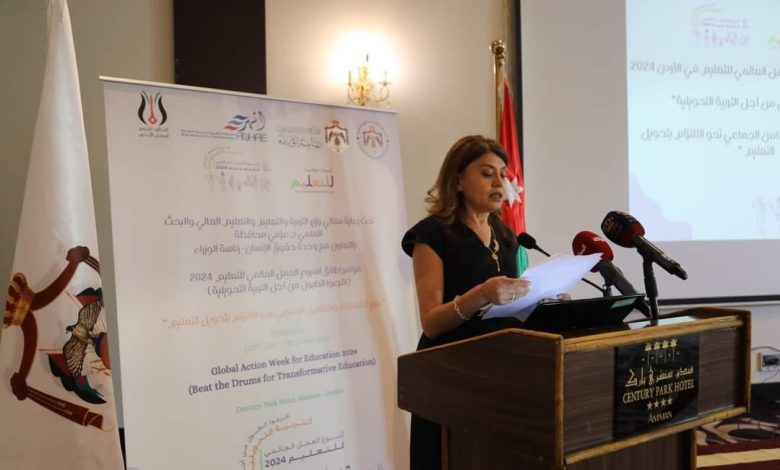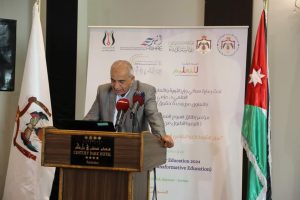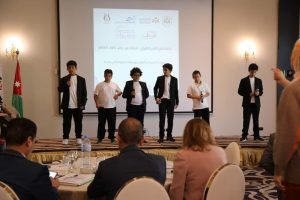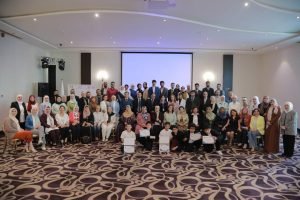
By : staff writer
Jordan Daily – Ministry of Education , and in collaboration with the Prime Minister’s Human Rights Unit, the Arab Network for Civic Education (ANHRE) and the Jordanian Coalition for Education for All launched the Global Action Week for Education 2024 in Amman on May 22, 2023.
The event, themed “Transformative Education Builds Social Justice, Peace, and Sustainable Development,” was attended by various governmental planning and supervisory departments, members of the Jordanian Coalition for Education for All, ANHRE, civil society institutions, researchers, educational experts, youth groups interested in education, and national institutions.
Global Action Week for Education is an annual campaign organized by the Global Campaign for Education to raise awareness about the importance of providing education for all. This year’s focus is on transformative education, aiming to include it as a key topic in the agenda of the Future Summit, highlight diverse perspectives on transformative education, and hold governments and decision-makers accountable for their commitments to the Education Transformation Summit.

Ms. Fotouh Younis, Executive Director of ANHRE, emphasized the network’s participation in the campaign in Jordan and at regional and international levels to urge Arab governments to provide adequate and sustainable funding that meets the educational needs of the Arab region.
She said that the network advocates for educational environments and supportive systems that are empowering, safe, healthy, and accessible to all children, especially those excluded from or within education, such as children with disabilities and refugees. It also stresses the need for new educational systems that enable youth and children to realize their full potential and focuses on crisis-sensitive planning to support a resilient, evidence-based educational system capable of adapting to national and regional challenges.
Dr. Khalil Al-Abdallat, Director of the Human Rights Unit at the Prime Minister’s Office, reaffirmed that education is a fundamental right that must not be infringed upon and is the responsibility of all states and governments.
He stated, “In Jordan, we are committed to providing high-quality education for all, including the most vulnerable and marginalized groups. We believe in the power of education to enable individuals to achieve their full potential and actively participate in building their communities.”
Ms. Khuzama Al-Rasheed, Vice President of the Jordanian Coalition for Education, referred to the fourth Sustainable Development Goal, which aims to “ensure inclusive and equitable quality education and promote lifelong learning opportunities for all.”
She called for a broad concept of educational outcomes to play a role in changing reality and achieving social justice, sustainable development, individual and collective freedom, and contributing to peace. She highlighted that transforming education is no longer an option but a necessity to keep pace with the demands of the modern age and achieve sustainable progress in our societies.

The conference included a special session titled “Enhancing Partnerships and Collective Solidarity towards Commitment to Transforming Education” to ensure the implementation of the strategic plan of the Jordanian Ministry of Education. This requires greater contributions from all stakeholders to support and invest in education, with the Ministry of Education open to cooperation and solidarity to ensure the right to education.

In their closing statement, participants called for the application of transformative leadership culture across various departments of the Ministry of Education to develop skills and capabilities related to planning, organizing, directing, executing, monitoring, and evaluating.
They urged the integration of transformative education into pre-service and in-service teacher training programs to keep up with the modern principles of education and its standards and values, and to include them in appropriate educational curricula in a rapidly changing world dominated by the Fourth Industrial Revolution.
They also emphasized the need for social justice in providing the education sector with sufficient funding and appropriate training for its staff to lead change efficiently towards sustainable development, ensuring that all learners have equal opportunities for high-quality education, and focusing on promoting a culture of peace, non-violence, and peaceful conflict resolution in a world where conflicts are increasing.

